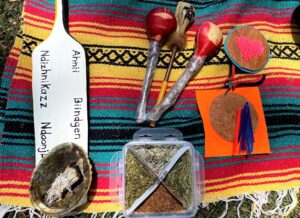New trauma-informed land-based program launched to support Indigenous youth mental health during pandemic

By Rick Garrick
TORONTO — The Mount Dennis Aboriginal Child and Family Centre is one of three centres in Toronto that recently implemented a land-based learning and knowledge program for families. The Pilot of Trauma-Informed Land-Based Response to COVID-19 program was launched by Native Child and Family Services of Toronto on June 15 as a way to respond to the coronavirus disease 2019 (COVID-19) pandemic.
“When COVID-19 first started and we were all stuck at home, originally we started to do some virtual programming [featuring art, songs, stories, Anishinaabemowin and other languages] on our Instagram page and we sent the link to all of the families,” says Reta Hamlin, supervisor at Mount Dennis Aboriginal Child and Family Centre and Aundeck Omni Kaning citizen. “We had guests come on and then we would do Zoom meetings as well with the families and children.”
Hamlin says the virtual programming was successful, with a couple of hundred people joining in for the sessions, but when the city’s parks began opening up, they decided to offer an opportunity for families to participate in programming on the land at different times.
“We started when you were allowed to have about 10 people, so there were about three or four staff and we’d have one family come each time, so maybe you’d have one parent and two children or two parents and two children,” Hamlin says. “It was just in the neighbourhood so they were able to walk over, but if they needed to we would provide a taxi service for them to meet us.”
Hamlin says three different areas were set up for the programming in the park, which had lots of shade, big trees and a little creek.
“And we had our Oshkaabewis, so she would be there to facilitate some cultural activities,” Hamlin says. “We would start by having a smudge, we would sing some songs together and then [the participants] would decide what they wanted to do next. Most of the time, they wanted to go to the water. It’s been really great for the staff and the families.”
Hamlin says a long paddle and some Velcro were used to share the smudge bowl at a safe distance. The program also had a screening process for the participants, including a temperature check and questions about whether they had been in contact with a person with COVID-19 in the last two weeks.
“It’s been great — one of the parents wrote us a statement on Friday [July 3] saying, ‘Thanks so much for everything your staff are doing, that my girls still get to see you and keep that relationship and that we are able to be on the land together because they were feeling a lot of anxiety at home’,” Hamlin says. “She feels good about being able to come out and be with us because she knows us and knows our program and knows it is a safe place.”
Jeffrey Schiffer, executive director at Native Child and Family Services of Toronto, says they worked with the City of Toronto’s Parks, Forestry and Recreation and Indigenous Affairs offices as well as Toronto Public Health to get the program going and are now looking to expand it to more parks across the city.
“We would like to be able to offer this at more parks and we’d like to be able to actually do day camps,” Schiffer says. “These three sites we are doing right now, those will continue over the course of the summer and we are hoping to add a fourth site and we are hoping to add day camps.”
Schiffer says Native Child and Family Services of Toronto staff were planning to deliver a presentation on expanding the program to Toronto’s Aboriginal Affairs Committee on July 7.
“When you’re going through a really hard time, like everybody is going through with COVID-19, being outside helps to mediate that,” Schiffer says. “Western science is starting to catch up with what our Elders have known for millennia, and that is being outside is good for you.”


